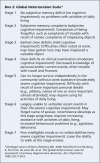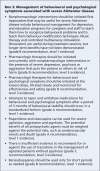Diagnosis and treatment of dementia: 6. Management of severe Alzheimer disease
- PMID: 19047609
- PMCID: PMC2585109
- DOI: 10.1503/cmaj.070804
Diagnosis and treatment of dementia: 6. Management of severe Alzheimer disease
Abstract
Background: The management of severe Alzheimer disease often presents difficult choices for clinicians and families. The disease is characterized by a need for full-time care and assistance with basic activities of daily living. We outline an evidence-based approach for these choices based on recommendations from the Third Canadian Consensus Conference on the Diagnosis and Treatment of Dementia.
Methods: We developed evidence-based guidelines using systematic literature searches, with specific criteria for the selection and quality assessment of articles, and a clear and transparent decision-making process. We selected articles published from January 1996 to December 2005 that dealt with the management of severe Alzheimer disease. Subsequent to the conference, we searched for additional articles published from January 2006 to March 2008 using the same search terms. We graded the strength of the evidence using the criteria of the Canadian Task Force on Preventive Health Care.
Results: We identified 940 articles, of which 838 were selected for further study. Thirty-four articles were judged to be of at least good or fair quality and were used to generate 17 recommendations. Assessment of severe Alzheimer disease should include the measurement of cognitive function and the assessment of behaviour, function, medical status, nutrition, safety and caregiver status. Management could include treatment with a cholinesterase inhibitor or memantine, or both. Treatment of neuropsychiatric symptoms begins with nonpharmacologic approaches to addressing behavioural problems. Severe agitation, aggression and psychosis, which are potentially dangerous to the patient, the caregiver and others in the environment, can be treated with atypical antipsychotics, with consideration of their increased risk of cerebrovascular events and death. All pharmacologic approaches require careful monitoring and periodic reassessment to determine whether continued treatment is necessary. Caregiver support and use of community resources are essential.
Interpretation: Severe Alzheimer disease requires frequent monitoring by health professionals. Simple nonpharmacologic approaches may address problems with mood and agitation. Antipsychotic drug therapy is occasionally necessary despite the inherent risks. Therapy with a cholinesterase inhibitor and memantine may be useful for selected patients.
References
-
- Reisberg B, Ferris SH, de Leon MJ, et al. The Global Deterioration Scale for assessment of primary degenerative dementia. Am J Psychiatry 1982;139:1136-9. - PubMed
-
- Reisberg B. Global measures: utility in defining and measuring treatment response in dementia. Int Psychogeriatr 2007;19:421-56. - PubMed
Publication types
MeSH terms
Substances
LinkOut - more resources
Full Text Sources
Medical





